牛津版高一英语教案译林牛津版高一英语模块一uint1 重点
牛津高中英语牛津版译林版高一模块一Unit1教案
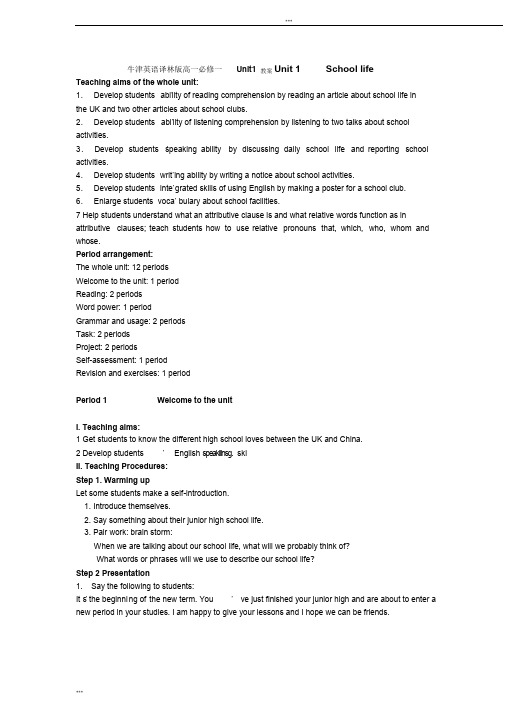
牛津英语译林版高一必修一Unit1 教案Unit 1 School lifeTeaching aims of the whole unit:1.Develop students abi’l ity of reading comprehension by reading an article about school life inthe UK and two other articles about school clubs.2.Develop students abi’lity of listening comprehension by listening to two talks about school activities.3.Develop students s’peaking ability by discussing daily school life and reporting school activities.4.Develop students writ’ing ability by writing a notice about school activities.5.Develop students inte’grated skills of using English by making a poster for a school club. 6.Enlarge students voca’bulary about school facilities.7 Help students understand what an attributive clause is and what relative words function as in attributive clauses; teach students how to use relative pronouns that, which, who, whom and whose.Period arrangement:The whole unit: 12 periodsWelcome to the unit: 1 periodReading: 2 periodsWord power: 1 periodGrammar and usage: 2 periodsTask: 2 periodsProject: 2 periodsSelf-assessment: 1 periodRevision and exercises: 1 periodPeriod 1 Welcome to the unitI. Teaching aims:1 Get students to know the different high school loves between the UK and China.2 Develop students ’English spe ak lil n s g. skiII. Teaching Procedures:Step 1. Warming upLet some students make a self-introduction.1. Introduce themselves.2. Say something about their junior high school life.3. Pair work: brain storm:When we are talking about our school life, what will we probably think of?What words or phrases will we use to describe our school life?Step 2 Presentation1. Say the following to students:It s’the beginni ng of the new term. You ’ve just finished your junior high and are about to enter a new period in your studies. I am happy to give your lessons and I hope we can be friends.I can see that some of your are eager to know what studying at senior high will be like. Will it be differ4ent from junior high? Well, there are certainly many differences between junior high and senior high, but there are also some things that are the same in every school in China.What about schools in other countries? Do you have different experiences? Are schools all overthe world the same? This is the subject of our first unit.2. Ask students to read the instruction and tell them:Here are three pictures that show some aspects of school life in the UK. Please read the instructions, look at the pictures: what's the difference between schools in China and the UK?Step 3 Discussion1 Ask students the following questions to talk about the words in the four pictures:Huge campus and low-rise buildingsWhat does h uge mean?What does low-rise mean?What about campus and school buildings in China?(Schools in China usually have a large enough campus to make sure students have enough space to study and play. But most school buildings have at least 3 storeys.)Lockers for every studentDo you know what a locker is?(There are rows of lockers by the classrooms for students to put their bookd, exercise-books and other belongings.)What do you think about locker for students?Do you think that we should have such locker in our school? Why or Why not?Fewer students in each classHow many students are there in our class?Do you know the number of students in a class in the UK?At ease with our teacherWhat can we know from this picture?What does the word ease mean? What do you think the phrase at ease mean?Were you getting on well with the teacher when you were in junior high?What relationship do you want to have with your teachers in senior high?2 Ask students to work in groups to talk about the four pictures and the differences betweenschools in the UK and China. Then ask several students to report their discussion to the whole class.aspects In the UK In ChinaHuge campus and We can see huge campus Schools in China usually have a large enoughlow-rise buildings and low-rise buildings. campus to make sure students have enough space to It is the biggest difference study and play in.from schools in China But most school buildings are taller, at least threestoreys.Lockers for every There are rows of lockers Students bring what they need for lessons to school student by the classrooms for and then take it all back home after school. Most students to put their schools in china do not have equipment in thestationary, books, classroom.exercise-books and otherbelongings.Fewer students in There are fewer studentsThere are usually more students in high school, each class in a class, no more than perhaps 40 to 50 per class. Recently some schools30 per class. are beginning to limit the number of students ineach class.At ease with our Students have a close It is similar in china. Nowadays, lots of teachers and teacher relationship with their students have established a good relationship with teachers. They feel at easeeach other. They respect each other and work toand comfortable with gain a better understanding of each other.them.4. Ask students to discuss the three questions in pairs, and them ask some of them to report their answers to the questions to the whole class.What is your dream school life like?What kind of school activities do you enjoy?What do you think of your life here in the new school?Step 4 Summary and HomeworkToday we ’ve mainly talked about the differences between the high school lives in the UK and in China. After class you should:1) Recall all the new words and expressions that we learn in this lesson.2) Find more about any other differences between the high school lives in the UK and in China, either by surf the Internet or by reading some articles in newspapers or magazines.3) Preview the following part: reading (page 2 to page 4).。
译林牛津模块1 Unit 1 语法:定语从句(译林牛津版高一英语必修一教案教学设计)
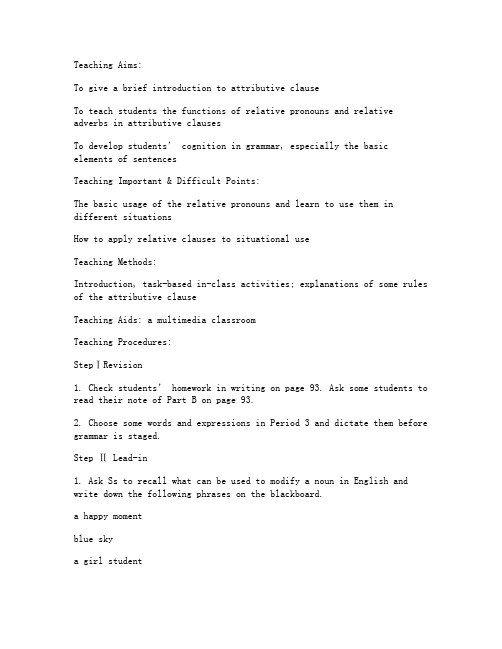
Teaching Aims:To give a brief introduction to attributive clauseTo teach students the functions of relative pronouns and relative adverbs in attributive clausesTo develop students’ cognition in grammar, especially the basic elements of sentencesTeaching Important & Difficult Points:The basic usage of the relative pronouns and learn to use them in different situationsHow to apply relative clauses to situational useTeaching Methods:Introduction, task-based in-class activities; explanations of some rules of the attributive clauseTeaching Aids: a multimedia classroomTeaching Procedures:StepⅠRevision1. Check students’ homework in writing on page 93. Ask some students to read their note of Part B on page 93.2. Choose some words and expressions in Period 3 and dictate them before grammar is staged.Step Ⅱ Lead-in1. Ask Ss to recall what can be used to modify a noun in English and write down the following phrases on the blackboard.a happy momentblue skya girl studentbus stationa monkey in the treethe article about your experience in the UKT: A noun, an adjective or the prepositional phrases can be used to modify a noun.2. Summarize the rules of the order in the examples above.We put adjectives or nouns before nouns to modify them while we put prepositional phrases after nouns to modify them.More examples(P8):Adjective: the green teamPrepositional phrase: the team in greenAttributive clause: the team who are wearing greenT: The last sentence is an attributive clause. That means a sentence is used to modify a noun in the same way that an adjective or prepositional phrase does. The nouns they modify are called antecedents.Step Ⅲ Introduction to attributive clauseGive some examples of AC on the screen and ask Ss to fill in the form below.1. The girl who/that is standing next to our teacher is her daughter.2. The girl whom/who /that my mother is talking to is my classmate.3. The girl whose name is Rose sits next to me.4. I can’t find the book which/that is borrowed from you.5. I can’t find t he book which/that you lent to me.6. I can’t find the book whose cover/the cover of which is red.Example Antecedent Attributive clause Function of the relative pronoun1 the girl who/that is standing next to our teacher subject2 the girl whom/who /that my mother is talking to object3 the girl whose name is Rose possessive4 the book which/that is borrowed from you subject5 the book which/that you lent to me object6 the book whose cover/the cover of which is red possessiveT: The nouns or the antecedent usually refers to a person /people or a thing/things, for example a story, a cake, books and so on. We usewhich/that as a relative pronoun to refer to things, while we usewho/whom/that as a relative pronoun to refer to people. Which/that is used as the subject or object in the AC. Who/that is used as the subject and whom/who/that is used as the object in the AC. And they will know when which, that, whom, who can be left out if it refers to an object in the AC.Step Ⅳ Identifying the attributive clause1. Let students to read the guidelines in Point 2 on page 8.2. Ask students to read the example sentences in Point 2 and let themsay what function of the bold part in each sentence is. Then ask them to point out the attributive clause in sentence and put the whole sentence into Chinese, so they can compare the different ways in which the attributive clause is expressed in English and in Chinese.Step ⅤPractice1. To test how well they understand AC, the teacher is to give them a timely self check ---- tick the sentences with AC in C1 on P88. Puzzles like 3, 8 may be ignored for the time being, left to be thought overafter class and solved in the next period.2. Ask students to identify the attributive clauses in the article on P9. Show their findings on a screen, and ask them to mark “antecedents”, “relatives” and translate the sentences into Chinese. Explain some key words and expressions such as “upon”, “develop an interest in”, “donate”, “display”, “make a speech” etc. What’s more, students are asked to classify these marked relatives into “relative pronouns” and “relative adverbs”. As for relative pronouns, they are also required to tell the functions they play in each attributive clause.1) David was one of the most important helpful students that we ever had. ( object )2) In 1998, he went to Oxford where he got interested in Chinese culture.3) Some of the cities in China which he likes most are Beijing, Shanghai, Harbin and Nanjing. ( object )4) Most of the students that he taught have become his friends.( object )5) Some of the books were gifts that he got from his Chinese friends and students. ( object )6) The paintings that David donated to the school are being displayed in the assembly hall. ( object )3. Learn the new words from page 9 to page 11.Ask students to turn to page 68 and study the new words (former-please).Step Ⅵ HomeworkAsk students to read the article on page 9 again and againAsk students to finish C1 on page 88. Get them to point out the antecedent, the relative pronoun or relative adverb in the sentence with an attributive clause.Period 6§Grammar and usage (2-2) Introduction to attributive clauses§Teaching Aims:To consolidate what’s learned the day beforeTo focus Ss’ attention on the usage of relative pronounsTo teach Ss in which situation who, whom, which or that can be left out.Teaching Important & Difficult Points:How to choose the right relative and use it properlyTeaching Methods:Introduction, task-based in-class activities; explanations of some rules of the attributive clauseTeaching Aids: a multimedia classroomTeaching Procedures:StepⅠRevision1. Check the homework with the students. Make sure that students know what an attributive clause is and the function of each relative word.2. Have a dictation to go over the words we learnt last period.Step Ⅱ PresentationQuestion: What does a noun usually refer to?(Students should know a person/people or a thing/things. For example, story, cake, and book are things, while friend, teacher and monitor are persons.)Step Ⅲ Using relative pronouns1. Ask students to read Point 1 on page 10 and point out the antecedent and the attributive clause in each sentence. Then ask: What doesthat/which function in each clause?Ask students to read the tip box, so the student will know thedifference between that and which.2. Ask students to read Point 2 and point out the antecedent and the attributive clause in each sentence. Then ask: What does who function in each clause?Ask students to read the tip box, so the students will know that can also be used to refer to a person/people.3. Ask students to read Point 3 and Point 4, and point out the antecedent in each sentence.4. Ask students to read the following sentences:Bb: She has a bother. I can’t remember his name.Question: What does his refer to? (His refers to a brother’s.)Bb: She has a brother whose name I can’t remember.Questions: Which part is the antecedent here? (a brother)What is it used as in the attributive clause? (attribute)Ask students to read Point 5 and point out the antecedent in each sentence. Then ask: What does the relative pronoun whose refer to in the two sentences.5. Show the following table on the screen and ask students to fill in.Antecedent Subject Object Attribute NoteFor persons who/that whom/who/that whose A relative pronoun can be omitted when it is used as the object in an attributive clause.For things which/that which/that whose/of whichStep ⅣSupplementation注意that which在代物时常常可以通用,但有时只宜于用that ,不用which.(1) 当先行词为不定代词all, much, little, only, just, every, last, one of, no, little, few, any, something, everything, anything,nothing, none, the one......及the very, the last, the next, the only或被不定代词修饰时e.g.: Is there anything (that) I can do for you? You should hand in all that you have.All that can be done has been done. In this factory I saw little / much that was different from ours.The only thing that I want to do is to have a rest. This is the very book that I’m looking for.We heard clearly every word that he said. She is the only person that understands me.(2)当先行词为序数词、形容词的最高级或被它们修饰时e.g.: He was the first person that passed the exam. This is the most interesting film that I have ever seen.The first thing that should be done is to get the tickets. Is that the best that you can do?That’s the most expensive hotel that we’ve ever stayed in.This novel is the second best one that I have ever read.When people talk about Hang Zhou, the first that comes to mind is the West Lake.(3)当先行词既有人又有物时e.g.: Do you know the things and persons that they are talking about?The film star and her film that you have just talked about is really well-known.She described in her compositions the people and places that impressed her most.The guests spoke highly of the children and their performances that they saw at the Children’s Palace.(4)由which或who等特殊疑问词引导的句子e.g.: Which is the bike that you lost? Which is the car that killed the boy?Who is the boy that won the gold medal? Who is the man that is reading the newspaper over there?(5)当先行词在主句中作表语,而关系代词也在从句中作表语时e.g.: Shanghai is no longer the city that it used to be. He is not the person that he used to be.c.f.: Shanghai is no longer what it used to be.(6)如果两个从句,其中一个关系代词用which, 另一个用that以避免重复。
重点高中译林牛津英语模块一Unit1教案
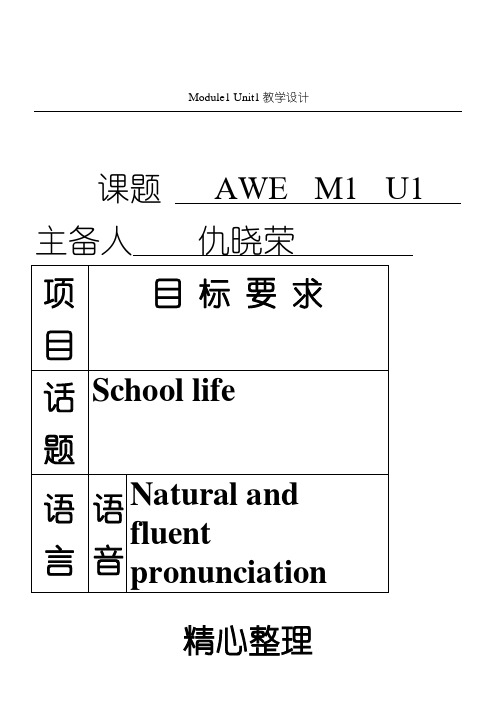
Module1 Unit1教学设计
精心整理
精心整理
精心整理
精心整理
精心整理
精心整理
精心整理
精心整理
精心整理
精心整理
精心整理
精心整理
注:目标要求可参阅南京外
精心整理
By the end of this period, students will be able to
favorite activities at
精心整理
school and showing others ways;
精心整理
2. different expressions to ask and show ways
1. PPT
精心整理
2. blackboard Learning procedures:
精心整理
精心整理
精心整理
精心整理
精心整理
精心整理
精心整理
精心整理
精心整理
精心整理
精心整理
精心整理
精心整理
精心整理
精心整理
精心整理
精心整理
精心整理
精心整理
Britain;
精心整理
2. learn to use two reading strategies: skimming and
精心整理
Predicted area of difficulties:
精心整理
精心整理
精心整理
精心整理
精心整理
精心整理
精心整理
精心整理
精心整理
精心整理
精心整理
精心整理
精心整理。
牛津译林版英语必修一Unit1Welcometotheunit教案
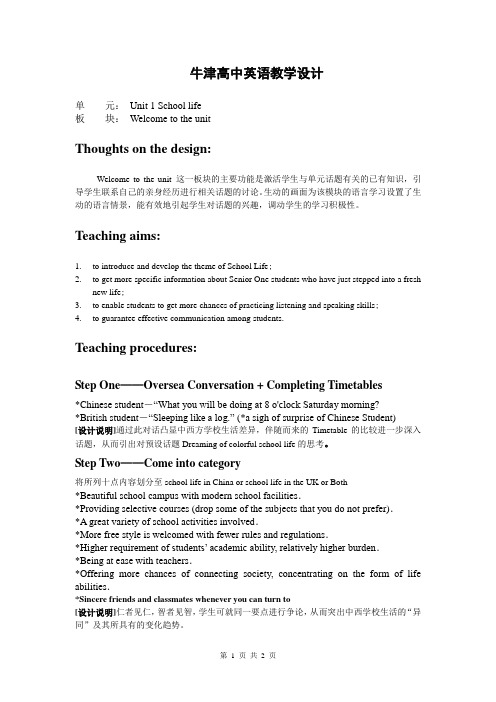
牛津高中英语教学设计单元:Unit 1 School life板块:Welcome to the unitThoughts on the design:Welcome to the unit 这一板块的主要功能是激活学生与单元话题有关的已有知识,引导学生联系自己的亲身经历进行相关话题的讨论。
生动的画面为该模块的语言学习设置了生动的语言情景,能有效地引起学生对话题的兴趣,调动学生的学习积极性。
Teaching aims:1.to introduce and develop the theme of School Life;2.to get more specific information about Senior One students who have just stepped into a freshnew life;3.to enable students to get more chances of practicing listening and speaking skills;4.to guarantee effective communication among students.Teaching procedures:Step One——Oversea Conversation + Completing Timetables*Chinese student-“What you will be doing at 8 o'clock Saturday morning?*British student-“Sleeping like a log.” (*a sigh of surprise of Chinese Student)[设计说明]通过此对话凸显中西方学校生活差异,伴随而来的Timetable的比较进一步深入话题,从而引出对预设话题Dreaming of colorful school life的思考。
牛津译林版高中英语必修1牛津译林版高中英语必修1模块一_Unit 1Reading教案

2. ReadingSchool life in the UKThe article is taken from a school magazine written by an exchange student. After studying in the UK for one year, she gives us a brief but clear description about what school life in the UK is like from her own experience. The reading strategy of the unit teaches students two basic reading skills, skimming and scanning.Step1 Leading—inAsk students if they have brought some photos or materials about the UK. The teacher can either ask students to pass them around or invite some students to make brief descriptions of the photos. Encourage students to use the information to discuss the difference and try to think of the reasons for these differences like this:1.Do you know of any differences between the lives of Chinese and British high school students?2.Can you try to give some reasons for the differences?After the discussion, the teacher may say: What makes you think of when you see the title?Which parts of school life in the UK do you think the author will talk about in the article?Step2 Fast reading for general ideasAsk students to go through the passage as quickly as possible and try to find answers to the three questions in Part A. Remind students only tofocus on and identify the most important information.1. What did Wei Hua think of her life in the UK? (She thought it wasa very enjoyable and exciting experience.)2. What subjects did Wei Hua study in the past year? (English, History, English Literature, Computer Science, Maths, Science, PE, Art, Cooking and French.)3. Which British city did Wei Hua go to? (Manchester)Step3 Detailed reading for important information1. Ask students to reread the passage and complete Part C1 and C2 individually. Questions in Part C1 are to check students’ ability to read and locate specific information. Statements in Part C2 serve as a strengthening activity for students’ comprehension of this passage. AnswersC1 1. F 2. T 3. T 4 .F 5. F 6. FC2 1. They should devote themselves to study.2 Because there were different students in some classes.3.Because all the homework was in English4. The teacher gave her much encouragement.5. She used English Everyday and spent an hour each day reading English books in the library.6. They like to eat dessert at the end of dinner.2. Ask students to go through the article first and find out what topics arecovered in it.Are the following aspects of school life mentioned in the article? (Teachers, classmates, friends, subjects, homework/assignments, grades, timetable, activities, school facilities, host family, food, hobbies, customs, traditions, festivals underlined are not mentioned )Ask the students to summary the main idea of each paragraph.3. Have students focus on the two exercises and ask them which of the reading methods they use when they are doing the two exercises. Ask them if they read word by word or sentence by sentence to find the answers to the two exercises. The activity can be conducted as follows: Now we've found out the most important information and got the main idea of the article. But I'm curious about the reading method you use when reading the article. Can you tell me how you find the main idea in such a short time? Do you think you have to read the whole article slowly and carefully in order to get a brief understanding of it?4. Explain some difficult points of the article (language points)5. Ask students to complete Parts D and E individually. Part D helps students to comprehend the meanings of the words from the context and match them with the correct definitions, while Part E is a letter from a British student who wants to make friends with Wei Hua. Students have to first understand the letter and then fill m the blanks with the proper words.AnswersD 1 d 2 g 3 a 4 e 5 b 6 c 7 fE (1) experienced (2) fond (3) literature (4) dessert(5) struggle (6) respect (7) encouragement6. Do Parts A1 and A2 in Workbook so as to be familiar with the usage of the words and expressions in the text.AnswersPart A1 (page 86)1 enjoyable 3 challenging 5 fun 7 exciting2 experience 4 e-mail 6 satisfaction 8 encouragement Part A2 (page 86)1 with 3 like 5 On 7 at2 to at 4 to 6 for about 8 On onStep 4 Post---reading1. Suppose you have a chance to interview Wei Hua. Apart from the things you have been told, what other information would you like to know about her life and study in the UK? The teacher can fire students’ imagination with the following:So far we ourselves don’t have the opportunity to go abroad to experience a foreign way of life. We are very happy today to have a student here who has just finished one year of study in the UK. Now you can all ask her some questions.2. Suppose you are Wei Hua and you are making a call to tell your Chinese classmates a day of school life in the UK.3. Suppose you are asked to write an article about the differences between high schools in the UK and in China. What kinds of differences will be dealt with in your article? The teacher can give some hints if necessary. timetable, subjects, teachers and students, size of the classroom, campus, school facilities, atmosphere, teaching methods, school rules and principles.4. Suppose you are studying in the UK, what subjects will you like to take if you can choose? Why? Do you think it necessary for the students to learn more languages? Why or why not?Step 5 Homework1. Ask students to write a summary of the article written by Wei Hua.2. Have students read the two articles in Reading on pages 90 and 91 in Workbook and answer the questions below them, so they can find more about school life in other countries. They can also do this as their homework.For the article in Part A, more questions can be asked to test students’understanding of some new words. For example,What does the phrase school uniforms mean?What kinds of clothes are fashionable?What clothes are leisure clothes?For the article in Part B, the following can be done by students: When you are taking SATs, you will .A. have to find answers to some math questions onlyB .only solve some problemsC. be chosen by the best collegesD. be tested on some math questions as well as some problem-solving questions(D)A special counselor is a person .A. who wants to go to a very good collegeB. who works in a high school to help students choose suitable colleges to go toC. who works in a college or a university to help high school students choose suitable colleges to go toD. who writes letters of application to colleges for high school students (B)5Ask students to do Part A and B of Listening on page 92 in Workbook.Then they fill in Part C according to what they have heard on the tape.They may also do the exercises after school as their homework. AnswersParts A and B (page 92I: 1 fifteen 2 English Maths 3 basketballDad: 1 letters 2 practice book 3 computer Australian students: 1 Maths Science 2 friendly tall Part C (page 92)1 English 3 practuce book 5 tall 7 friendly2 Maths 4 basketball 6 letters 8 computer* More information:英国中学的类型对于非欧盟国家的学生来说,除非其双亲均居住在英国境内,他们的子女均不得就读英国政府赞助的学校。
译林牛津版高中英语模块1教案全套

牛津高中英语模块一(第1讲)【教学容与教学要求】一、教学容:牛津高中英语模块一Unit 1 (上)二、教学要求:1.掌握和校园生活有关的常用单词、词组与句型。
2.学会描述校园生活和学校设施。
High school is a time of discovery, learning and hard work!高中是探索、学习和辛勤劳动的时期Huge campus and low-rise building 学校面积大,没有高层建筑。
Twelve laboratories are available for different experiments.12个实验室可供不同试验使用。
Each room es with its own bothroom and Internet access.每个房间都有自己的卫生间和英特网接口。
3.学习阅读技巧:skimming&scanning。
4.语法:定语从句(一)【知识重点与学习难点】一、重要单词:access achieve attend assembly article available average canteen club challenging context donate display experience extra graduate gym heading locker low-rise literature poster relax二、重点词组:class teacher 班主任at ease with 和….相处不拘束school hours学校作息时间earn respect from 赢得…的尊敬sound like听起来象for free 免费get a general idea 了解大意as well as 除….以外, 也key words 关键词word by word 逐字逐句地find one’s way around 认识路develop an interest in 培养对….的兴趣surf the Internet网上冲浪【难点讲解】1.What is your dream school life like?你理想中的学校生活是什么样子?这里dream表示心目中最理想的. 如dream team (梦之队)。
英语牛津译林1unit1精品教案(第2讲)
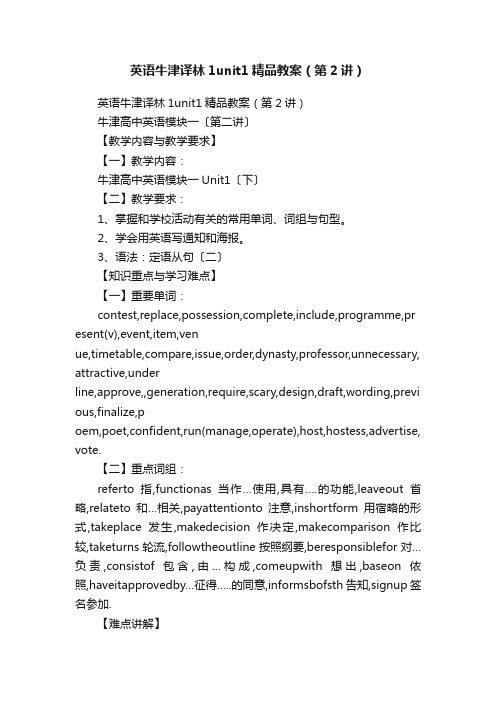
英语牛津译林1unit1精品教案(第2讲)英语牛津译林1unit1精品教案(第2讲)牛津高中英语模块一〔第二讲〕【教学内容与教学要求】【一】教学内容:牛津高中英语模块一Unit1〔下〕【二】教学要求:1、掌握和学校活动有关的常用单词、词组与句型。
2、学会用英语写通知和海报。
3、语法:定语从句〔二〕【知识重点与学习难点】【一】重要单词:contest,replace,possession,complete,include,programme,pr esent(v),event,item,venue,timetable,compare,issue,order,dynasty,professor,unnecessary, attractive,underline,approve,,generation,require,scary,design,draft,wording,previ ous,finalize,poem,poet,confident,run(manage,operate),host,hostess,advertise, vote.【二】重点词组:referto指,functionas当作…使用,具有….的功能,leaveout省略,relateto和…相关,payattentionto注意,inshortform用宿略的形式,takeplace发生,makedecision作决定,makecomparison作比较,taketurns轮流,followtheoutline按照纲要,beresponsiblefor对…负责,consistof包含,由…构成,comeupwith想出,baseon依照,haveitapprovedby…征得…..的同意,informsbofsth告知,signup签名参加.【难点讲解】1.Ihavetodomyhomeworkinaplacethathasdesksandchairs.我必须在一个有课桌椅的地方做家庭作业。
牛津高一英语模块1Unit1表格式教案(译林牛津版高一英语必修一教案教学设计)
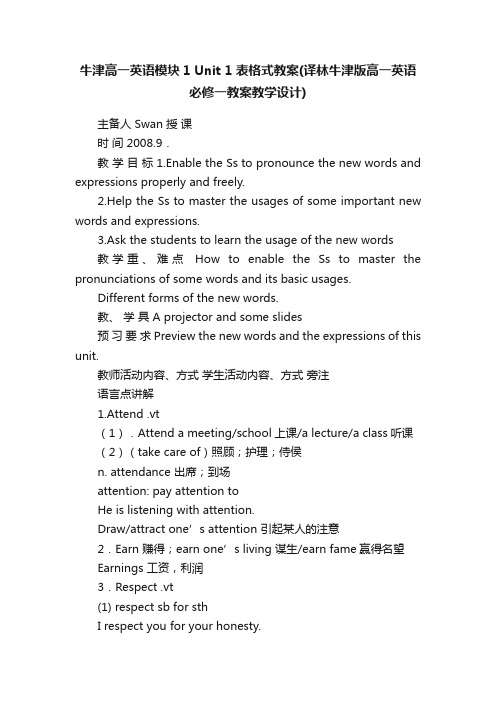
牛津高一英语模块1 Unit 1 表格式教案(译林牛津版高一英语必修一教案教学设计)主备人 Swan 授课时间 2008.9.教学目标 1.Enable the Ss to pronounce the new words and expressions properly and freely.2.Help the Ss to master the usages of some important new words and expressions.3.Ask the students to learn the usage of the new words教学重、难点How to enable the Ss to master the pronunciations of some words and its basic usages.Different forms of the new words.教、学具 A projector and some slides预习要求 Preview the new words and the expressions of this unit.教师活动内容、方式学生活动内容、方式旁注语言点讲解1.Attend .vt(1).Attend a meeting/school上课/a lecture/a class听课(2)(take care of)照顾;护理;侍侯n. attendance 出席;到场attention: pay attention toHe is listening with attention.Draw/attract one’s attention 引起某人的注意2.Earn 赚得;earn one’s living 谋生/earn fame赢得名望Earnings 工资,利润3.Respect .vt(1) respect sb for sthI respect you for your honesty.n. I have the greatest respect for you.The new officer soon won/earned the respect of his men. In respect of/to 关于,就……而言I will give a speech in respect of the learning methods.4. achieve success /victory/one’s purpose/aim Achievement(n)5.average .平均Above (below) the averageThe average temperature 平均温度。
译林牛津版高中英语模块1教案全套

牛津高中英语模块一(第1讲)【教学内容与教学要求】一、教学内容:牛津高中英语模块一Unit 1 (上)二、教学要求:1.掌握和校园生活有关的常用单词、词组与句型.2.学会描述校园生活和学校设施.High school is a time of discovery, learning and hard work!高中是探索、学习和辛勤劳动的时期Huge campus and low-rise building 学校面积大,没有高层建筑。
Twelve laboratories are available for different experiments。
12个实验室可供不同试验使用. Each room comes with its own bothroom and Internet access。
每个房间都有自己的卫生间和英特网接口。
3.学习阅读技巧:skimming&scanning。
4.语法:定语从句(一)【知识重点与学习难点】一、重要单词:access achieve attend assembly article available average canteen club challenging context donate display experience extra graduate gym heading locker low—rise literature poster relax二、重点词组:class teacher 班主任at ease with 和….相处不拘束school hours学校作息时间earn respect from 赢得…的尊敬sound like听起来象for free 免费get a general idea 了解大意as well as 除…。
以外, 也key words 关键词word by word 逐字逐句地find one’s way around 认识路develop an interest in 培养对….的兴趣surf the Internet网上冲浪【难点讲解】1.What is your dream school life like?你理想中的学校生活是什么样子?这里dream表示心目中最理想的。
【教学】牛津译林版英语高一上册Module1Unit1Schoollifeword教案
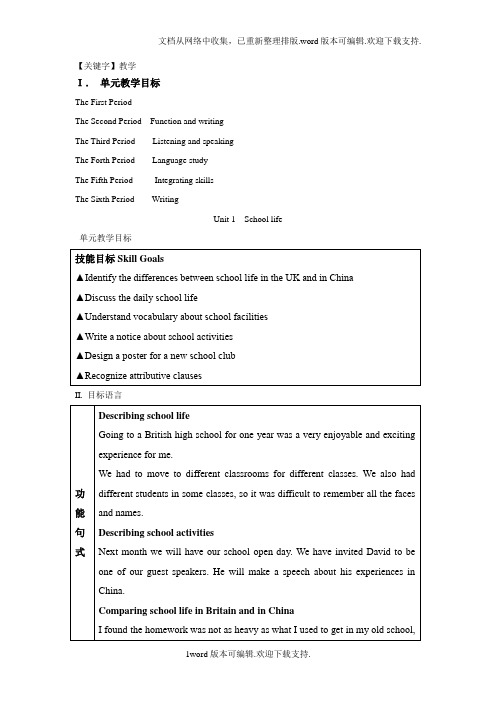
【关键字】教学I.单元教学目标The First PeriodThe Second Period Function and writingThe Third Period Listening and speakingThe Forth Period Language studyThe Fifth Period Integrating skillsThe Sixth Period WritingUnit 1 School life 单元教学目标II. 目标语言Ⅲ. 教材分析与教材重组1. 教材分析本单元以School life为话题,旨在通过单元教学使学生了解英国校园生活的一些基本情况及中英两国校园生活的不同之处;学习并能运用表示校园设施的一些基本词汇;学习定语从句的基本概念及关系代词的用法;能就校园活动的话题展开讨论;能就校园活动情况向班任老师做出报告;学习通知的写法;学会设计以介绍学校俱乐部为主题的海报等。
1.1 Welcome to the unit 部分利用四幅图片,分别从(校园风貌、生活设施、课堂教学、师生关系)四个不同的侧面介绍了英国校园生活的有关情况。
该部分还设计了三个讨论话题,引导学生对中英两国校园生活进行比较,并就相关话题发表自己的看法。
1.2 Reading部分的短文节选自一份校园杂志。
文章由一位交换留学生所写。
作者通过自己的亲身经历简要地介绍了英国学校生活的一些情况。
文章前后分别设计了五个部分的练习:前两个练习(A、B)要求学生运用本单元介绍的两种基本阅读方法(skimming and scanning)阅读文章,把握文章主旨大意,了解文中明显的细节内容;练习C1通过问题的形式考查学生对文中具体信息的把握程度;C2通过判断正误练习加深学生对阅读材料的理解;D部分为词汇练习,要求学生首先联系上下文猜测所给词汇的含义;然后通过配对练习帮助学生掌握新词的含义和用法;E部分要求学生通过运用所给词汇填空的方式完成一封英国学生写给Wei Hua的信件,以进一步加深学生对阅读内容的理解;练习F设计了两个话题,引导学生对校园生活有关话题展开讨论,以获得对文章深层次的理解。
牛津译林版英语必修一Unit1Reading1精品教案

牛津译林版英语必修一Unit1Reading1精品教案一、教学内容本节课我们将学习牛津译林版英语必修一Unit1中Reading1部分。
具体内容包括:导入部分,通过讨论“友谊”这个主题,激发学生对阅读文本兴趣;阅读部分,详细解析文章《Back to the past》篇章结构、语言特点和主旨大意;实践环节,让学生运用本节课学到知识点,进行角色扮演和小组讨论。
二、教学目标1. 让学生掌握文章中生词、短语和句型,提高英语阅读能力。
2. 培养学生理解、分析和评价文章能力,提升思维品质。
3. 引导学生体会友谊珍贵,培养积极向上人生观。
三、教学难点与重点1. 教学难点:文章中一些复杂句子理解和分析,以及对文章主旨大意把握。
2. 教学重点:文章中生词、短语和句型学习,以及友谊主题探讨。
四、教具与学具准备1. 教具:多媒体课件、黑板、粉笔。
2. 学具:教材、笔记本、字典。
五、教学过程1. 导入:通过讨论“友谊”这个主题,让学生分享彼此友谊故事,激发学生对阅读文本兴趣。
2. 阅读前:展示与文章相关图片,引导学生预测文章内容,培养学生预测能力。
3. 阅读中:让学生快速阅读文章,解文章大意;然后细读文章,解析文章中生词、短语和句型,分析文章篇章结构,理解文章主旨。
4. 阅读后:进行角色扮演和小组讨论,让学生运用所学知识,深入探讨友谊主题。
六、板书设计1. 文章Back to the past2. 生词、短语和句型3. 文章篇章结构:引子发展高潮结局4. 友谊主题:友谊珍贵七、作业设计1. 作业题目:(1)根据文章内容,完成填空题。
(2)运用本节课学到句型,编写一段关于友谊对话。
(3)思考并回答:如何维护和珍惜友谊?答案:(1)略(2)略(3)略八、课后反思及拓展延伸1. 课后反思:关注学生在课堂上参与程度,及时调整教学方法,提高教学效果。
2. 拓展延伸:鼓励学生在课后阅读更多关于友谊文章,观看相关电影,深入探讨友谊主题,提高英语素养。
译林牛津高一英语必修一uint重点短语和句子学习教案
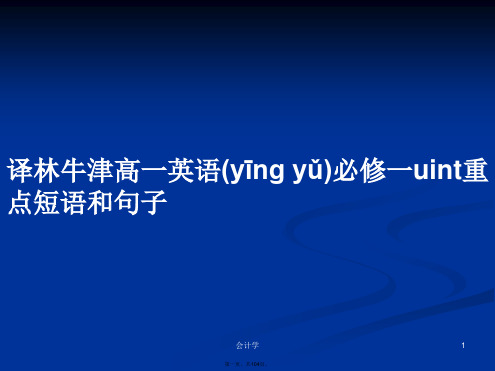
enjoyably adv. 愉快(yúkuài)地
eg: The evening passed enjoyably.
这个晚上过得很愉快(yúkuài)。
2、experience n.[C,U] &vt. 经历,经验, 体验
eg: Mr Kroll is an officer with experience,who has
in British because school starts around 9 a.m.
and ends about 3.30 p.m. This means I
could
第1页/共103页
get up an hour later than usual,as schools 第二页,共104页。
A.devoted on teaching B.devoted to teaching
C.devoting to teaching D.devoted to teach 4、At last,she___her gold of becoming an excellent teacher.
A.explained
teacher was Miss Burke—I loved the lessons that she
gave in English Litereture. In our class there were 28
students. This is about the average size 第14页/共103页 for British
Eg: Working in these conditions is not a pleasure but a suffer.
(=It is not a pleasu第r3页e/共1b03页ut a suffer working in these condition.)
牛津高中英语 牛津版 译林版 高一 模块一 unit教案
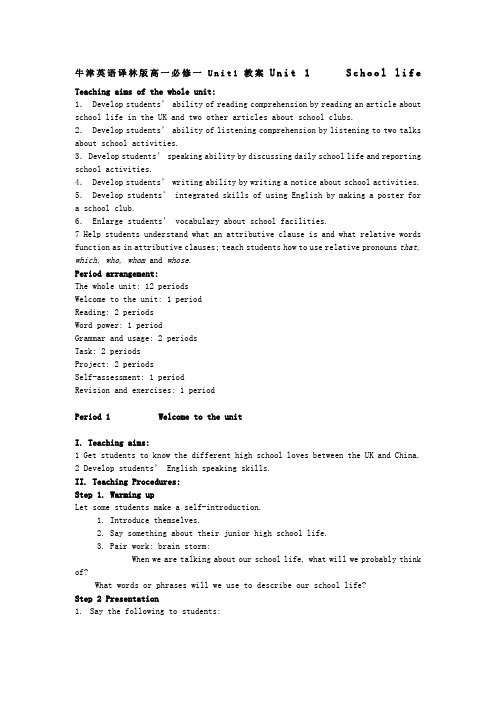
牛津英语译林版高一必修一U n i t1教案U n i t1S c h o o l l i f eTeaching aims of the whole unit:1.Develop students’ability of reading comprehension by reading an article about school life in the UK and two other articles about school clubs.2.Develop students’ability of listening comprehension by listening to two talks about school activities.3.Develop students’speaking ability by discussing daily school life and reporting school activities.4.Develop students’writing ability by writing a notice about school activities. 5.Develop students’ integrated skills of using English by making a poster for a school club.6.Enlarge students’ vocabulary about school facilities.7 Help students understand what an attributive clause is and what relative words function as in attributive clauses; teach students how to use relative pronouns that, which, who, whom and whose.Period arrangement:The whole unit: 12 periodsWelcome to the unit: 1 periodReading: 2 periodsWord power: 1 periodGrammar and usage: 2 periodsTask: 2 periodsProject: 2 periodsSelf-assessment: 1 periodRevision and exercises: 1 periodPeriod 1 Welcome to the unitI. Teaching aims:1 Get students to know the different high school loves between the UK and China.2 Develop students’ English speaking ski lls.II. Teaching Procedures:Step 1. Warming upLet some students make a self-introduction.1. Introduce themselves.2. Say something about their junior high school life.3. Pair work: brain storm:When we are talking about our school life, what will we probably think of?What words or phrases will we use to describe our school life?Step 2 Presentation1.Say the following to students:It’s the beginni ng of the new term. You’ve just finished your junior high and are about to enter a new period in your studies. I am happy to give your lessons and I hope we can be friends.I can see that some of your are eager to know what studying at senior high will be like. Will it be differ4ent from junior high? Well, there are certainly many differences between junior high and senior high, but there are also some things that are the same in every school in China.What about schools in other countries? Do you have different experiences? Are schools all over the world the same? This is the subject of our first unit.2. Ask students to read the instruction and tell them:Here are three pictures that show some aspects of school life in the UK. Please read the instructions, look at the pictures: what's the difference between schools in China and the UK?Step 3 Discussion1 Ask students the following questions to talk about the words in the four pictures: Huge campus and low-rise buildingsWhat does huge mean?What does low-rise mean?What about campus and school buildings in China?(Schools in China usually have a large enough campus to make sure students have enough space to study and play. But most school buildings have at least 3 storeys.) Lockers for every studentDo you know what a locker is?(There are rows of lockers by the classrooms for students to put their bookd, exercise-books and other belongings.)What do you think about locker for students?Do you think that we should have such locker in our school? Why or Why not? Fewer students in each classHow many students are there in our class?Do you know the number of students in a class in the UK?At ease with our teacherWhat can we know from this picture?What does the word ease mean? What do you think the phrase at ease mean?Were you getting on well with the teacher when you were in junior high?What relationship do you want to have with your teachers in senior high?2 Ask students to work in groups to talk about the four pictures and the differences between schools in the UK and China. Then ask several students to report their discussion to the whole class.3. Ask students to discuss the three questions in pairs, and them ask some of them to report their answers to the questions to the whole class.What is your dream school life like?What kind of school activities do you enjoy?What do you think of your life here in the new school?Step 4 Summary and HomeworkToday we’ve mainly talked about the differences between the high school lives in the UK and in China. After class you should:1) Recall all the new words and expressions that we learn in this lesson.2) Find more about any other differences between the high school lives in the UK and in China, either by surf the Internet or by reading some articles in newspapers or magazines.3) Preview the following part: reading (page 2 to page 4).。
模块1Unit1-3部分教学案(译林牛津版高一英语必修一教案教学设计)

模块1Unit1-3部分教学案(译林牛津版高一英语必修一教案教学设计)Unit 1 School LifePeriod 1 Word Study高一英语备课组Ⅰ.Teaching aims and requirements:(1)To introduce some words about school life and develop sts ability.(2) To ask sts to master their usage and encourage them to practise(3) To learn to be cooperative and helpful when working together.Ⅱ.Important points & difficult points:(1)To understand the words(2) To master their usage(3) To enable the sts to know how to compare1. attend vt. 参加,出席(婚礼、宴会等) attendance n. 到场,出席辨析:attend, take part in, join 和 join inattend是正式用语,一般指参加会议、典礼、婚礼、葬礼及去听课、听报告等。
attend a meeting 出席会议attend school 上学attend a lecture 听报告attend a class 听课attend one’s wedding 参加婚礼take part in多指参加群众性活动、会议、劳动、游行等,往往指参加者的态度积极,并在其中起一定作用,如体育、比赛、游戏、讨论、战斗等,有时可与join in 互换。
join指加入某党派、团体、组织等,并成为其中的一员,如参军、入团、入党等。
join in强调参加正在进行的活动,如比赛、娱乐、谈话等,尤其指和其他人一起参加某项活动。
牛津模块1Unit1全单元教学案(译林牛津版高一英语必修一教案教学设计)
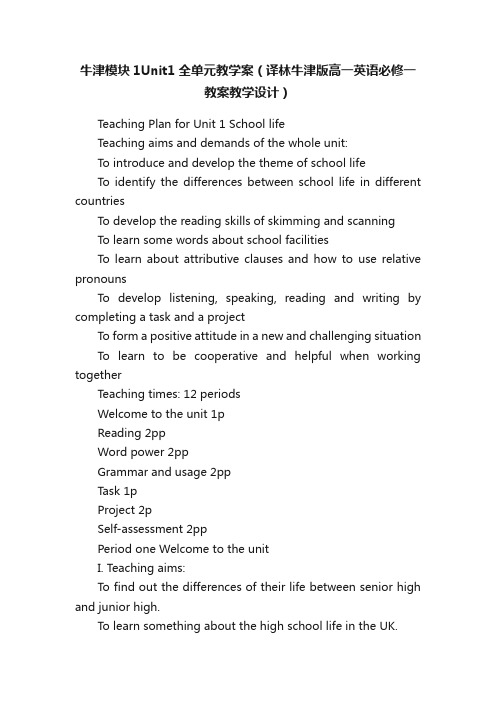
牛津模块1Unit1全单元教学案(译林牛津版高一英语必修一教案教学设计)Teaching Plan for Unit 1 School lifeTeaching aims and demands of the whole unit:To introduce and develop the theme of school lifeTo identify the differences between school life in different countriesTo develop the reading skills of skimming and scanningTo learn some words about school facilitiesTo learn about attributive clauses and how to use relative pronounsTo develop listening, speaking, reading and writing by completing a task and a projectTo form a positive attitude in a new and challenging situation To learn to be cooperative and helpful when working togetherTeaching times: 12 periodsWelcome to the unit 1pReading 2ppWord power 2ppGrammar and usage 2ppTask 1pProject 2pSelf-assessment 2ppPeriod one Welcome to the unitI. Teaching aims:To find out the differences of their life between senior high and junior high.To learn something about the high school life in the UK.To know how to get on well with high school life / study.To find out how an activity attracts the students and helps the studentsII. Teaching Procedures:Step 1 GreetingsStep 2. Warming up and Lead-in1. Let some students make a self-introduction.2. Say something about their junior high school life.Step 3. PresentationPair work: brain storm:When we are talking about our school life, what will we probably think of?Step 4 Comparison (Group work)Here are three pictures that show some aspects of school life in the UK. Please read the instructions, look at the pictures: what’s the difference between schools in China and the UK?Aspects In the UK In ChinaHuge campus and low-rise buildings We can see huge campus and low-rise buildings.It is the biggest difference from schools in China Schools in China usually have a large enough campus to make sure students have enough space to study and play in.But most school buildings are taller, at least three storeys.Lockers for every student There are rows of lockers by the classrooms for students to put their stationary, books, exercise-books and other belongings. Students bring what they need for lessons to school and then take it all back home after school. Most schools in china do not have equipment in the classroom.Fewer students in each class There are fewer students in a class, no more than 30 per class. There are usually more studentsin high school, perhaps 40 to 50 per class. Recently some school are beginning to limit the number of students in each class.At ease with our teacher Students have a close relationship with their teachers. They feel at ease and comfortable with them. It is similar in china. Nowadays, lots of teachers and students have established a good relationship with each other. They respect each other and work to gain a better understanding of each other.Step 5 DiscussionWhat kind of school activities do you enjoy?Do you know any further differences between the schools in the UK and China?What is your dream school life like?What do you think the teachers should be like?What do you think the students should be like?What do you think the relations between teachers and students should be like?Step 6 ExtensionWhat are the factors that will lead to the success of the further?Step 7 SummaryHomework1) Recall all the new words and expressions that appear in this unit.2) Write a short passage about your dream school. (100words)3) Preview the following lesson.Period two ReadingTeaching aims:1. To read a magazine article about school life in the UK.2. To learn to apply two basic reading skills: skimming andscanning.3. To learn some expressions about school life.Teaching procedures:Step 1 RevisionCheck the homework exercise.Step 2 PresentationYesterday discussed the differences between high schools in our country and the UK.Now we are going to read a magazine article which is written by an exchanging student. She has been studying in the UK for one year. Now she gives a clear brief introduction about her school life there.Before we read the article, we are going to learn the reading strategy: skimming and scanning. (P.3: Reading strategy) Skimming: to get a general idea of the article.Focus on the title, heading, captions, the first and last sentences of paragraphs, charts and pictures …Scanning: to locate specific information about an article.Look for key words and phrases, dates and words in bold, italics or capital letters…Step 3 Reading1. Skimming question:How does Wei Hua feel about her life in the UK?2. Scanning:1) What topics are mentioned in the WeiHua’s letter?(opt. are the following aspects of school life mentioned in the article?Teachers classmates friends subjects homework grades timetable activities school facilities host family food hobbies customs traditions festivals)2) Scan the passage and complete Part C1, C2 on page 4Step 4 Group workWhat’s the similarity and difference between the schools in China and the UK?★Aspects In the UK In ChinasimilaritydifferenceStep 5 Practice:Pair workNow you are a reporter from the school magazine, and have a chance to interview Wei Hua. What other information would you like to know about her life and study in the UK?Suppose your desk mate is Wei Hua, make a dialogue.Homework.1. Complete parts D and E2. Read the two articles in reading on pages 82 and 83 in wb and answers the questions below them.3. Daniel Adams will come to your school as an exchange student. Write a letter to him and introduce your school life to him.4. Preview the following lesson.Period three Language focusStep 1 Revision:1. Check the homework2. Complete the chart and retell the letter.On the first dayTeachers Mr. HeywoodMiss BurkeSize of a classroomSubjectsFoodWei Hua’s feelings and progressStep 2. Language focus1. Words:a) attend (join / join in / take part in )b) preparec) miss (missing / gone / lost)d) experiencee) informationf) sounds2. Phrases:a) for freeb) a bit / a littlec) as well as3. Sentences:a) Going to a British school for one year has been a very enjoyable and exciting experience for me.b) I do like eating.Step 5. Practice1. Complete wb A1, A2,2. Translation1)Jim加入了我们的讨论之列。
译林牛津版高一英语必修1全套教案(共47张)
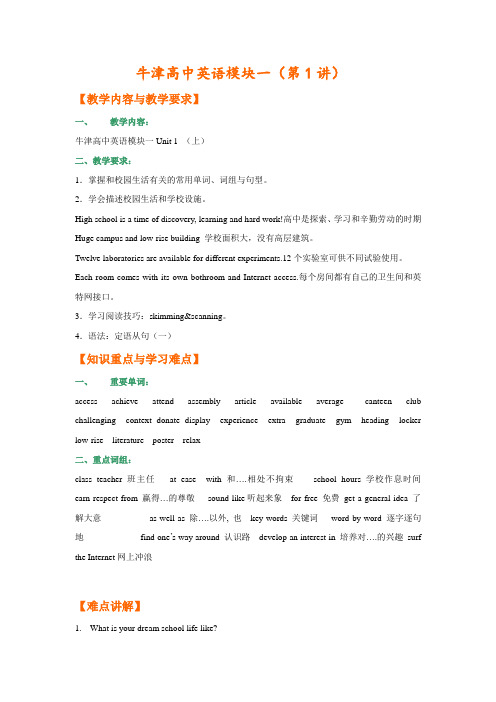
牛津高中英语模块一(第1讲)【教学内容与教学要求】一、教学内容:牛津高中英语模块一Unit 1 (上)二、教学要求:1.掌握和校园生活有关的常用单词、词组与句型。
2.学会描述校园生活和学校设施。
High school is a time of discovery, learning and hard work!高中是探索、学习和辛勤劳动的时期Huge campus and low-rise building 学校面积大,没有高层建筑。
Twelve laboratories are available for different experiments.12个实验室可供不同试验使用。
Each room comes with its own bothroom and Internet access.每个房间都有自己的卫生间和英特网接口。
3.学习阅读技巧:skimming&scanning。
4.语法:定语从句(一)【知识重点与学习难点】一、重要单词:access achieve attend assembly article available average canteen club challenging context donate display experience extra graduate gym heading locker low-rise literature poster relax二、重点词组:class teacher 班主任at ease with 和….相处不拘束school hours学校作息时间earn respect from 赢得…的尊敬sound like听起来象for free 免费get a general idea 了解大意as well as 除….以外, 也key words 关键词word by word 逐字逐句地find one’s way around 认识路develop an interest in 培养对….的兴趣surf the Internet网上冲浪【难点讲解】1.What is your dream school life like?你理想中的学校生活是什么样子?这里dream表示心目中最理想的. 如dream team (梦之队)。
高中译林牛津英语模块一Unit1教案

M o d u l e1U n i t1教学设计课型Welcome & Word powerLearning objectives:By the end of this period, students will be able to1. enlarge their own vocabulary by knowing the exact names of all kinds of school facilities and activities;2. improve their spoken skills by describing their favorite activities at school and showing others ways;3. be aware of cultural differences by comparing school life in China and in Britain.Focus of the lesson:1. the names of school facilities2. different expressions to ask and show waysPredicted area of difficulties:using locative prepositions and prepositional phrases properlyLearning aids:1. PPT2. blackboard课型Reading(I)Learning objectives:By the end of this period, students will be able to1. know more information about the school life in Britain;2. learn to use two reading strategies: skimming and scanning;3. form a reasonable attitude to different ways of education. Focus of the lesson:1. skimming2. scanning课型Grammar& UsageLearningobjectives:By the end of this period, students will be able to1. understand the grammatical functions of attributive clauses;2. use relative pronouns ‘that’ ‘which’ ‘who’ ‘whom’ ‘whose’;3. enjoy the neatness and beauty of attributive clauses comparing them with simple sentences.Focus of the lesson:课型TaskLearning objectives:By the end of this lesson, students will be able to1. understand the dates, time, places in a program;2. know how to get the information by comparing;3. report his or her decision to the whole class. write a notice. Focus of the lesson:1. notes-taking by reading and listening2. Writing a noticePredicted learning difficulties:1.the understanding of all numbers appearing as time, date or day2. writing a noticeLearning aids:1. PPT2. tape and tape recorderLearning procedures:课型ProjectLearning objectives:By the end of this period, students will be able to1. know what school clubs are like;2. work out with group members how to start a school club;3. learn the importance of teamwork.Focus of the lesson:1. getting to know what school clubs are like2.how to start a clubPredicted learning difficulties:1. the design of a school clubLearning aids:1. multi-media courseware(PPT)2. blackboardLearning procedures:。
译林牛津版高中英语模块1教案全套

牛津高中英语模块一(第1讲)【教学内容与教学要求】一、教学内容:牛津高中英语模块一Unit 1 (上)二、教学要求:1.掌握和校园生活有关的常用单词、词组与句型。
2.学会描述校园生活和学校设施.High school is a time of discovery,learning and hard work!高中是探索、学习和辛勤劳动的时期Huge campus and low-rise building 学校面积大,没有高层建筑。
Twelve laboratories are available for different experiments。
12个实验室可供不同试验使用。
Each room comes with its own bothroom and Internet access。
每个房间都有自己的卫生间和英特网接口.3.学习阅读技巧:skimming&scanning。
4.语法:定语从句(一)【知识重点与学习难点】一、重要单词:access achieve attend assembly article available average canteen club challenging context donate display experience extra graduate gym heading locker low-rise literature poster relax二、重点词组:class teacher 班主任at ease with 和….相处不拘束school hours学校作息时间earn respect from 赢得…的尊敬sound like听起来象for free 免费get a general idea 了解大意as well as 除…。
以外, 也key words 关键词word by word 逐字逐句地find one's way around 认识路develop an interest in 培养对….的兴趣surf the Internet网上冲浪【难点讲解】1.What is your dream school life like?你理想中的学校生活是什么样子?这里dream表示心目中最理想的. 如dream team (梦之队)。
- 1、下载文档前请自行甄别文档内容的完整性,平台不提供额外的编辑、内容补充、找答案等附加服务。
- 2、"仅部分预览"的文档,不可在线预览部分如存在完整性等问题,可反馈申请退款(可完整预览的文档不适用该条件!)。
- 3、如文档侵犯您的权益,请联系客服反馈,我们会尽快为您处理(人工客服工作时间:9:00-18:30)。
clinic/ medical centre/ first-aid centre/ ambulance.
5.餐饮部/ 食堂 canteen / dinning hall 6. 有…可提供/可用 (rooms/ labs)… be available
7.你有空吗 Are you available/ free?
8.在平均之上/下 on/ above / below average
• School life in the UK. P2-3
9.没有…重 be not as heavy as… 10.过去常做… used to do…
被用来做 be used to do… 习惯… be used to sth. 11. 一点点 a little/ a bit 一点也不 not a bit = not at all 不止一点 not a little = much 12. 有很大提高 improve a lot
• P11 1...很难取悦 sb. be hard to please
• Project. P18-19 1.经营/管理 run (a company/ school…) 2.亲密朋友 close friend 3.下一代 next generation 4.代沟 generation gap 5.选择… select sth. 6.设计海报 design a poster 7.投票做… vote to do sth. 8.提出想法/观点 come up with ( a good idea)
1.一次愉快的经历 an enjoyable experience 2.感到很开心 be happy with… 3.参加集会/会议/婚礼 attend assembly/wedding
4.获得尊重 earn respect
5.做…最好的方式 the best way to do / of doing 6.取得高分/实现目标 achieve high grades/ goals 7.平均温度/收入 average temperature/ income
18.为考试做准备 prepare for the test
19.准备三餐饭 prepare three meals
20.为…做好准备(n.) make preparation for
• School life in the UK. P2-3
21.在期末/ 在路尽头
At the end of this term/ road 22.退修一些科目 drop some subjects
5.正如你所提及到的as you mentioned …
( in your letter/ article) 6.想起… think of 7.有很多机会做… have many chances to do sth.
• Word Power P6
1.讲演厅 lecture hall
2.语音室/ 实验室 language/ science laboratory 3.寝室 dormitory / dorm
• Project. P18-19 9.尽量使…吸引人 make sth. as attractive as possible 10.通知某人某事 inform sb. of sth.
•Key Sentences:
• P3
1.在英国上中学的那一年对我来说是一次 非常开心,非常兴奋的经历.
Going to a British high school for one year is a very enjoyable and exciting experience for me.
• School life in the UK. P2-3
13.一次挑战 a ( great ) challenge
14.具有挑战性 be challenging
15.向某人发出挑战 challenge sb. to sth.
16.免费 for free
17.准备跳舞
prepare to dance
• P2
2.我坐在一个叫戴安的女孩旁边.
I sat next to a girl whose name was Diane.
3.他告诉我们赢得学校尊重的最好方法是努 力学习,取得高分.
8.攀登架 climbing bars 9.吊环 rings 10.哑铃 dumb-bell 11.平衡木 beam 12.跳绳 skipping rope 13.篮球场 basketball court 14.杠铃 barbell 15.垫子 mat
• Former student returns from China. P9 1.原来的学生/老师/同学 former students/ teachers
2.对…开始感兴趣 get interested in… 3.发展在…方面的兴趣 develop an interest in 4.从…毕业 graduate from 5.把…捐给 donate (v)… to … 6.献血者 blood donor (n.) 7.嘉宾发言人 guest speaker 8.发表演讲 make a speech
牛津版高一英语教案译林牛津版高一 英语模块一uint1 重点
•Key Phrases:
• Welcome to the unit P1
1.大的校园
huge campus
2.低矮的建筑 low-rise building
3.与…在一起很自在 be at ease with …
• School life in the UK. P2-3
23.经历这种不同的生活方式
experience this different way of life
• P5 E
1.介绍自己introduce oneself to … / self-introduction
2.我确实喜欢 I do like… 3.邮箱地址 email ( n.) address 4.发邮件给… email ( v.) sb.
